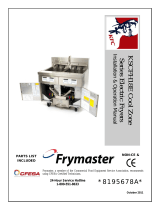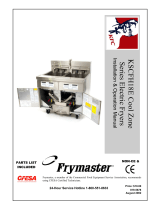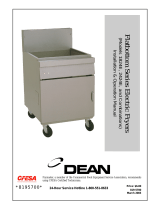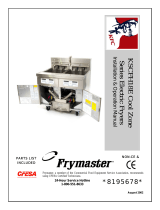
5
CONTENTS
1.0 APPLIANCE INFORMATION ..................................................................................... 7
2.0 OPERATION .............................................................................................................. 8
2.1 COMPONENT PARTS ............................................................................................ 8
2.2 CONTROLS .......................................................................................................... 10
2.3 USING THE FRYER – NORMAL OPERATION .................................................... 11
2.4 USING THE FRYER – ECO MODE ...................................................................... 13
2.5 USING THE FRYER – FAT MELT ........................................................................ 13
2.6 FILTRATION ......................................................................................................... 14
3.0 CLEANING AND MAINTENANCE ........................................................................... 15
3.1 CLEANING AND MAINTENANCE ........................................................................ 16
4.0 SPECIFICATION ...................................................................................................... 19
4.1 APPLIANCE WEIGHT TABLE .............................................................................. 19
4.2 TECHNICAL DATA TABLE ................................................................................... 19
5.0 DIMENSIONS / CONNECTION LOCATIONS .......................................................... 20
6.0 INSTALLATION ....................................................................................................... 20
6.1 SITING / CLEARANCES ....................................................................................... 21
6.2 ASSEMBLY .......................................................................................................... 21
6.3 ELECTRIC SUPPLY & CONNECTION ................................................................. 22
6.4 COMMISSIONING ................................................................................................ 23
6.5 SUITING ............................................................................................................... 25
7.0 SERVICING ............................................................................................................. 28
7.1 DOOR REMOVAL................................................................................................. 28
7.2 CONTROL PANEL REMOVAL (REMOVE DOOR FIRST) .................................... 28
7.3 TEMPERATURE CONTROL, NEON AND COVER CAP REMOVAL .................... 29
7.4 LOWER SWITCH PANEL REMOVAL ................................................................... 29
7.5 MODE CONTROL, PUMP SWITCH & SAFETY THERMOSTAT REMOVAL ........ 29
7.6 CONTACTOR REMOVAL ..................................................................................... 30
7.7 OPERATING AND SAFETY THERMOSTAT SENSOR REMOVAL ...................... 30
7.8 DRAIN VALVE REMOVAL .................................................................................... 32
7.9 HEATING ELEMENT AND MICROSWITCH REMOVAL ....................................... 33
7.10 PUMP & TIMER REMOVAL (FROM FRONT) ................................................... 34
7.11 PUMP & TIMER REMOVAL (FROM REAR) ...................................................... 35
























